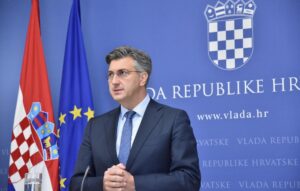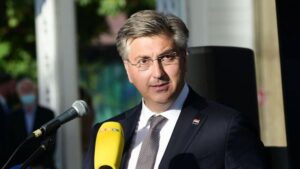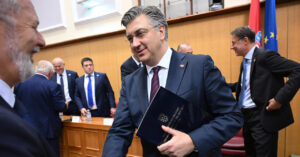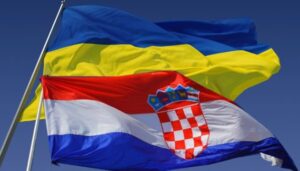
Speaking at the Dubrovnik Forum on Saturday, Croatian Prime Minister Andrej Plenković assured of continued support for Ukraine and recalled the assistance already provided to Kyiv in various areas.
In his speech, Plenković pointed to the negative consequences for Europe and the world of the Covid-19 pandemic, “prolonged by Russian aggression against Ukraine, which has devalued the importance of international law and fundamental principles.”
“On behalf of the Croatian government, I would like to once again express my support for Ukraine, the Ukrainian people, the President, the entire government and thank Minister Kuleba for coming to Dubrovnik today,” the Croatian prime minister said.
He emphasized that there is unity in support of Ukraine among a huge number of countries. Thus, Plenković recalled the recent Global Peace Summit in Switzerland, where, as he noted, about a hundred international organizations and countries were represented, supporting the project of finding a peaceful solution to the consequences of Russian aggression against Ukraine, rather than a solution that would reward the aggressor and thus send a negative signal to other potential aggressors.
“Croatia is helping Ukraine in the political, diplomatic, technical, humanitarian, economic and military spheres, and we will continue to provide all forms of support. Especially given our specific interests in the investigation of war crimes, in humanitarian demining, which we have been facing for 30 years and which we will complete only in March 2026,” Plenković emphasized.

Croatian Prime Minister Andrej Plenković has confirmed his participation in the Peace Summit in Switzerland, President of Ukraine Volodymyr Zelenskyy said following a conversation with the head of the Croatian government.
“I congratulated him on his appointment as Prime Minister of the Republic of Croatia and expressed gratitude for Croatia’s continued support for Ukraine. I also thanked Prime Minister Plenkovic for confirming his participation in the Peace Summit in Switzerland,” Zelenskyy wrote in a telegram on Monday.
The parties also discussed Croatia’s support for the start of negotiations on Ukraine’s accession to the EU and the possibility of joining the G7 Vilnius Declaration of Support for Ukraine.

Croatia has held the first meeting of the parliament elected in the April 17 elections. Gordan Jandrokovic was elected speaker, with 144 out of 151 deputies voting for his candidacy, the Croatian newspaper Jutarnji list reports. Gondar Jandroković represents the HDZ (Croatian Democratic Commonwealth) party and became the speaker of the Croatian parliament for the third time.
“It is an extraordinary honor to be trusted for the third time to fulfill the duties of the Croatian Parliament. We are living in a dangerous historical period: the war in Ukraine and the Middle East, we cannot avoid the fact that the neighborhood is also a potential source of instability, we are facing the challenges of climate change, disruptions in global supply chains,” Jandroković said.
After several weeks of negotiations, a coalition was formed in the parliament, which included the HDZ and the Fatherland Movement parties. Croatian Prime Minister Andrej Plenković said that the new government’s program of activities was being finalized.
At the beginning of Russia’s full-scale invasion of Ukraine, the Croatian parliament and government expressed support for Ukraine, granting it EU candidate status and providing economic support.
Sources:
www.jutarnji.hr (https://www.jutarnji.hr/vijesti/hrvatska/plenkovic-komentirao-nove-ministre-susnjara-sam-tek-upoznao-ppd-pitao-sam-ga-vidjet-cemo-15461328)

An intergovernmental agreement on cooperation in the field of demining was signed on Tuesday in Zagreb by First Vice Prime Minister and Minister of Economy of Ukraine Yulia Svyrydenko and Vice Prime Minister and Minister of the Interior of Croatia Davor Božinović in the presence of Croatian Prime Minister Andrej Plenković, the Ministry of Economy of Ukraine reports.
“Ukraine is very grateful to the Croatian people and the Croatian government for the political, military, financial and humanitarian support that our country and Ukrainians have received since the beginning of the large-scale invasion… And today, Ukraine needs Croatia’s experience in demining and reconstruction and rehabilitation,” Svyrydenko said during a conversation with Plenkovic.
She also thanked Croatia for the programs aimed at rehabilitation of Ukrainian defenders and children of Ukrainian soldiers.
Speaking during the signing of the agreement on cooperation in the field of demining, Svyrydenko noted that Croatian-made demining machines are already operating in Ukrainian fields, and in the summer, Ukrainian and Croatian manufacturers agreed to localize the production of such machines in Ukraine.
“Today we are strengthening our cooperation. The intergovernmental agreement on cooperation in demining launches a new stage of cooperation between governments, experts, demining specialists, and manufacturers of both countries,” said the First Deputy Prime Minister.
The agreement envisages cooperation in the following areas: non-technical and technical survey, demining, and territory clearance; public education on the risks associated with explosive ordnance; assistance to mine victims; and development of a regulatory framework and standard procedures in the field of mine action.
In addition, it provides for trainings for specialists, exchange of experience among experts and teachers in training demining specialists, transfer of expert knowledge and best practices; exchange of knowledge on the production of protective equipment, mine detection and demining equipment, and training and certification of mine-sniffing dogs.
During the meeting in Zagreb, the parties also discussed strengthening cooperation between the countries in the economic sphere and in the area of reconstruction.

Croatian Prime Minister Andrej Plenkovic said he does not intend to allow Ukrainian grain to enter the country’s domestic market, Politico reported on Tuesday.
“Croatia’s position and desire is that we are a transit country, not a country that will receive a huge amount of Ukrainian grain, which is cheaper than ours,” Plenkovic said.
According to him, imports of such products would lead to the fact that “our farmers would be in trouble.”
On September 15, the European Commission announced the termination of restrictive measures on the export of Ukrainian grain and other food products to the EU. Later, the authorities of Poland, Hungary, and Slovakia announced their own bans.

Agroprosperis agricultural group has supplied 17 thousand tons of agricultural products to Italy and Spain through the ports of Croatia since the beginning of 2023, the press service of the agricultural holding reported.
“In the first weeks of September of this year, Ukrainian and world media were abuzz with the news that Ukraine started exporting grain through the seaports of Croatia. “Agroprosperis is among the domestic exporters who were the first to use this route this year. It has become an important step in the expansion of Ukrainian agro-logistics against the background of the aggressor’s blockade of the grain corridor from the deep-water ports of the Black Sea,” the company’s website reported.
The agroholding noted that it was familiar with this export channel and had used it in previous years. During 2021-2022, the agroholding shipped 4,000 tons of GMO-free soybeans to Italy through Croatian ports for export. Since the beginning of the 2023-2024 marketing year, 6 thousand tons of corn were shipped to Italy and 11 thousand tons of wheat to Spain.
Currently, Agroprosperis is implementing a program of accumulation of wheat and soybeans for customers in Egypt and Europe.
According to the report, the structural subdivisions of the agroholding continue production of agricultural products and their export through alternative logistic routes. Agroprosperis noted the selfless work of its subdivisions in Sumy and Chernihiv regions, which grow, take care of crops and harvest crops under shelling.
In addition, the Agroprosperis Charitable Foundation is also active, providing direct assistance to 2,400 war victims totaling more than UAH 30 million.
Before the Russian military invasion, Agroprosperis had a land bank of 430 thousand hectares and total storage capacity of 800 thousand tons of crops. The holding grew and exported more than 2 million tons of grain and oilseeds per year.
“Agroprosperis operates through five divisions: Golden Sunrise (Agro), Bio Agro, Ray Agro, Latagro, New Agro Management, and provides financing to Ukrainian grain producers through Agroprosperis Bank.